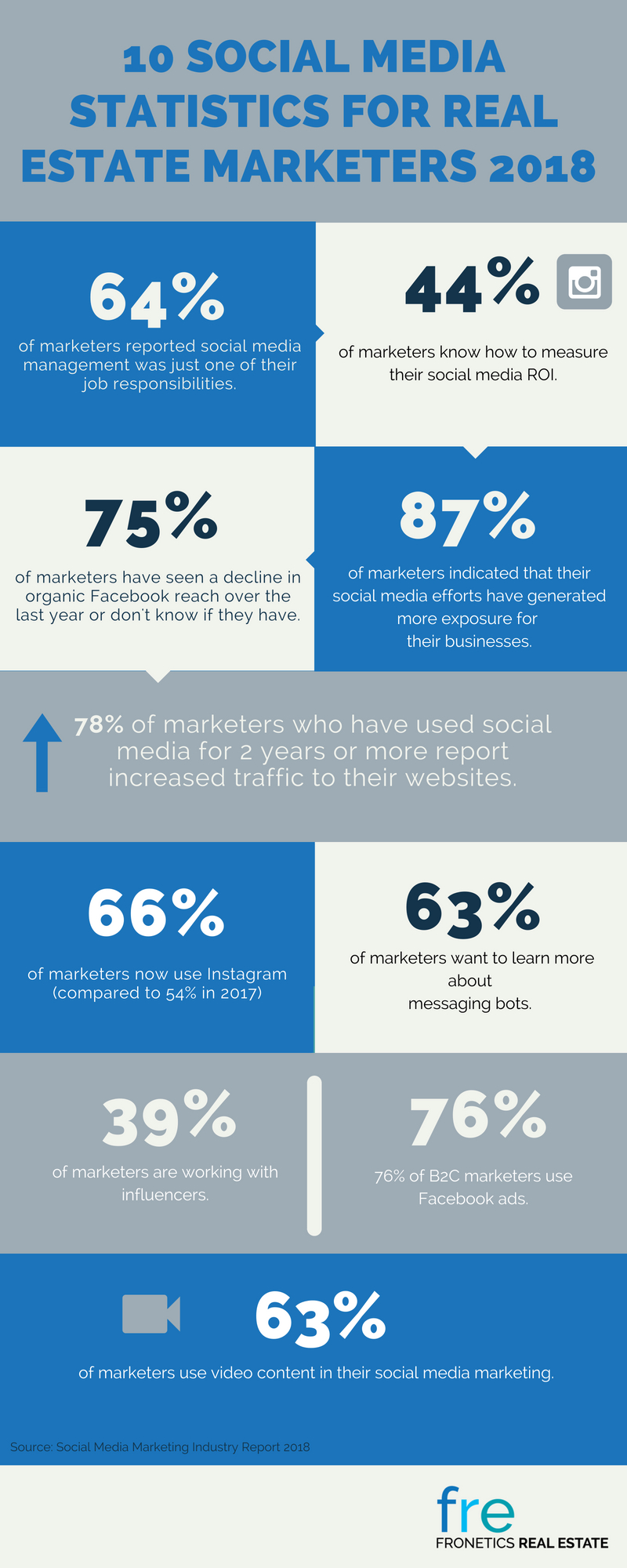Archive for Elizabeth Hines

5 TED Talks for Real Estate Marketers
Need a little inspiration? Check out our top 5 TED talks for real estate marketers.
The popularity of TED Talks seems to have increased recently. A decade ago, the lecture series focused on technology, education, and design wasn’t a household name. Today, the number of views totals well over 1 billion.
TED Talks can be inspiring and full of useful information from thought leaders in all aspects of the field. Here are 5 that we think real estate marketers should watch right now.
5 TED Talks for real estate marketers
Co-founder of Fundrise — an investment platform for creating a simple, low-cost way for anyone to access real estate — Ben Miller discusses the role technology will play in how people invest in real estate in the future. He offers his perspective, gleaned from 15 years in real estate and finance, in which he has acquired, developed, and financed more than $500 million in property.
You may have heard the phrase “The Golden Circle,” coined by Simon Sinek. It starts with the question “why?” and examines the emotional core of what makes employees and customers buy into a company. In his extremely popular TED Talk, Sinek discusses the connection between The Golden Circle, marketing, and consumer behavior — a must-watch for all content marketing professionals.
Prolific author and marketing guru Seth Godin offers his insights about creating remarkable stories. He posits the idea that when it comes to getting attention, bad or bizarre ideas are more successful than boring ones. Ultimately, he advocates for a tailored, specific message spread passionately to those who want to listen.
Gunnar Branson is the CEO of the National Association of Real Estate Investment Managers. His TED Talk applies Moore’s Law (which predicts that technology will get exponentially smaller as it advances) to real estate. He predicts that the physical space we live, work, and play in will transform in front of our eyes, and discusses how those changes will impact the real estate market.
This one is good for the soul! Author, scholar, and speaker Kio Stark says, “When you talk to strangers, you’re making beautiful interruptions into the expected narrative of your daily life — and theirs.” Her talk explores the benefits of pushing through discomfort with strangers, and embracing what can become profound moments of genuine connection. It’s an inspiring listen for real estate marketers, in a field that’s all about connecting and telling a story.
What TED Talks for real estate do you recommend?
Related posts:
- 10 Social Media Statistics for Real Estate Marketers 2018
- 4 Real Estate Marketing Trends 2018
- 10 Must-Follow Blogs for Real Estate Marketers
Archive for Elizabeth Hines

10 Social Media Statistics for Real Estate Marketers 2018
The latest social media statistics show growth of Instagram, social messaging bots, and video content.
We joke around here that one thing that will always stay the same is that social media will always be changing. 2018 has been a remarkable example of that thus far, particularly in regards to platforms like Facebook.
Every so often, we like to take a step back and look at what the data is telling us about where social media is heading and what that might mean for real estate marketers.
Social Media Examiner’s 10th annual study, 2018 Social Media Marketing Industry Report, surveyed more than 5,700 marketers from across the world in a variety of industries — including real estate. It offers a really comprehensive view of what’s going on in social media in our industry and beyond.
I’ve pulled out 10 social media statistics from this report that I want to talk about in more depth. I think they say a lot about where social media is headed and what real estate marketers should be paying attention to.
10 social media statistics for real estate marketers
1) For 64% of marketers, social media management is just one of their job responsibilities.
This one blows me away, knowing how much time and effort it takes to run a company’s social media program. Only about one-third (36%) of marketers manage social media full time. The other two-thirds have to do that on top of their other responsibilities. That’s crazy!
Developers, property managers, and real estate marketers: it’s time to recognize how important social media is for marketing your property and dedicate the appropriate resources to social media management. If you can’t afford to hire someone to do it full time, consider outsourcing this task.
2) Only 44% of marketers agree they can measure their social media ROI.
Only 10% of survey respondents “strongly agree” and 34% “agree” with the statement, “I am able to measure the return on investment (ROI) for my social media activities.”
Again, I’m kind of blown away. As a firm that relies on data and analytics to inform our processes and strategies, including social, it seems irresponsible to not know if your efforts are effective.
Ok, on one hand, it’s actually really difficult to measure social media ROI. That’s in large part because so many of the benefits are intangible. You should really be thinking of social media investment in terms of potential, not dollars.
BUT there are some ways to calculate ROI for all your content marketing and social media efforts. Here are a few resources:
- What Metrics Should You Track in Real Estate Marketing?
- The Metrics You Should Be Measuring in Real Estate Marketing (Hint: Not Vanity Metrics)
- How to Measure Brand Awareness: A Guide for Real Estate Marketers
3) 75% of marketers have seen a decline in organic Facebook reach over the last year or don’t know if they have.
A significant 52% of marketers surveyed said they saw their Facebook reach decline in the last year. Plus, 23% of marketers surveyed were unsure if it had or not — probably not a good sign. Yet 97% of B2C marketers are using Facebook. Something’s not adding up for me here.
As we’ve written about a lot recently, businesses need to be keeping a close eye on Facebook in light of all the recent changes. While we at Fronetics Real Estate are not ready to write off Facebook for business (especially real estate companies) completely yet, it’s time to start doing things a little differently.
Here are a few things you should do immediately to ensure you’re still reaching your target audience:
- Focus on newsworthy content that drives engagement. You need to start thinking of Facebook as a place to post and discuss active news items, hot-button issues, and highly shareable content (content that is educational or entertaining, for example).
- Tell your community to access the See First feature. Users who still want to see posts from certain Pages they follow can choose “See First” in News Feed Preferences. So, quite simply, we suggest asking your followers to choose to see your content.
- Consider your ad budget. Especially for new properties or those who rely heavily on referral traffic, you might want to consider reallocating budget to sponsored ads.
Stay tuned to the Fronetics blog as we continue to gather information and offer suggestions.
4) 87% of marketers rank more exposure for their businesses as the primary benefit of their social media efforts.
Building brand awareness is a key benefit of social media use for real estate. The Social Media Examiner survey respondents said that increased traffic was the second major benefit, with 78% reporting positive results. These top two benefits have remained virtually unchanged for 4 years.
5) 78% of marketers who have used social media for 2 years or more report increased traffic to their websites.
Also to note, 83% of those who have used social media for 5 or more years “strongly agree” or “agree” that traffic has increased to their websites because of social media activity.
I wanted to pull these social media statistics out because they reinforce the time-honored truth that content marketing (including social media management) is a long-term solution — not an overnight fix. The benefits, especially in terms of metrics like traffic, grow exponentially over time.
You have to allow time for prospects to find you and for your audience to grow organically. Use your social media platforms as a means to distribute meaningful information to your target audience and to communicate with prospects and residents, and it will pay off.
6) 66% of marketers are now using Instagram.
In 2016 and 2017, we answered a lot of questions about Snapchat. Founder of the Content Marketing Institute Joe Pulizzi named Snapchat one of the next big trends in content marketing for 2017. Everyone thought this platform was going to be our new social media darling.
Instead, Instagram has surpassed Twitter and LinkedIn to be the second-most-used social media platform. (It was fourth in 2017.) Use is up dramatically from 54% in 2017. Those are numbers worth paying attention to.
Most of our real estate clients use Instagram with great success. If you’re not on this platform, it’s time to join.
7) 63% of marketers use video content in their social media marketing.
One real estate marketing trend everyone got right? The growing prevalence of video.
Not only do nearly two-thirds of marketers use video content in their social media marketing, 23% use live video. What’s more, 77% plan to increase video content and 63% plan to increase live video in the next year.
The real estate industry is embracing the power of video marketing. And the good news is, you don’t need expensive camera, lighting, or a production studio — your smartphone can be just as effective for creating video content for your social media outlets.
8) 70% of marketers want to learn more about messenger bots.
Here’s a big takeaway from the survey: Everyone’s talking about messenger bots/social messenger apps. While adoption is still pretty low (only 15% are using Facebook messenger bots now), 51% of survey respondents plan to include them in future marketing.
It’s time to start reading up on marketing automation tools like chatbots and social messenger apps. We’ve got a lot of information about these things scheduled on our blog in the next few months, so keep coming back for more information on how these tools apply to real estate marketing.
9) 39% of marketers are working with influencers.
Influencer marketing is another trend we’ve been talking about lately. It makes sense: Buyers value the opinions of peers and colleagues. In fact, 82% of Americans seek recommendations when making a purchase of any kind. Such a major purchase like real estate can be greatly influenced by what buyers’ peers think of the neighborhood, community or building, etc.
In real estate, it’s important to consider other people who might influence buyers and renters. Aside from family and friends, financial advisors, brokers, interior designers, and celebrities (be they local professional athletes or social media celebrities) can have an impact on buyers’ opinions of a property.
10) 76% of B2C marketers use Facebook ads.
Interesting that more than three-fourths of B2C brands advertise on Facebook. On one hand, if you’re not doing it, do you lose your seat at the table? But on the other, are there opportunities on other advertising platforms that aren’t so crowded?
The survey also found that 72% of B2C marketers are interested in learning about Instagram ads. This is likely because of the platform’s phenomenal growth and, no doubt, brands’ success with it thus far. It’s something to think about when planning your social advertising.
If you’re interested, I recommend reading the whole 44-page report from Social Media Examiner. There are a ton of really interesting social media statistics that offer great insight into how marketers are using social media and how it’s changing — both over the the last few years and in the short-term.
What social media statistics are most interesting to you?
Related posts:
- A Visual Guide to Social Media Posting Frequency for Real Estate
- How to Use Social Media Hashtags in Real Estate Marketing
- Social Media Can Be a Strategic Weapon in Real Estate Marketing
Archive for Elizabeth Hines

Should I Be Using Facebook Carousel Ads?
Facebook carousel ads helped one real estate company achieve a 63% increase in click-through rate and a 24% decrease in cost-per-acquisition.
Facebook carousel ads offer a highly visual and engaging way to promote your properties. Not only that, Kinetic Social recently found that carousel ads are up to 10 times more effective than static sponsored Facebook posts at driving traffic to advertisers’ websites. And if that’s not enough, they boast a 72% higher click-through rate than single-image mobile app ads.
The data makes it clear: Facebook carousel ads are absolutely something you should be using to promote your properties! Here’s a quick refresher on what they are, and some of our favorite tips for making the most of this promotional tool.
What’s a Facebook carousel ad?
This ad format integrates across Facebook and Instagram. It shows 3-5 images, headlines, links, and/or calls-to-action in a single ad unit, which users can click through. The “carousel” refers to the way images scroll horizontally across the screen, creating an engaging way for users to interact with your images. Each image has its own description and link, helping to drive traffic more effectively.
As you might expect, having the ability to showcase multiple images in an ad helps in lowering cost-per-conversion or -click, optimizing your creative output, and driving results across campaign objectives.
If it’s not already obvious, this format is a no-brainer for advertising real estate. Check out this spotlight from Facebook on Lamudi, an online real estate marketplace that used Facebook carousel ads to the tune of a 63% increase in click-through rate and a 24% decrease in cost-per-acquisition.
Using Facebook carousel ads
Creating a carousel ad is a simple process. It allows you to be creative and tell a story with the images you choose. Here are three easy steps for getting started:
1) Decide on your objective.
Having a defined goal is key when it comes to any content marketing, and carousel ad creation is no different. Facebook helps you target an objective, giving you the choice to select either “send people to your website” or “increase conversions.” Depending on your selection, an algorithm optimizes who sees your ad and when.
2) Create your ad.
Start by selecting “multiple images in one ad.” Next, get creative! Be sure to connect your ad to your Facebook page, and write a message that will stay on the screen over the images as users scroll through. Select 3-5 images, with a recommended size of 600 x 600 pixels each. You can write a separate headline and short description for each image.
3) Make the most of your images.
Facebook gives you the option to select “automatically show the best performing images and links first” — do it! This means that, as your campaign progresses, the image that’s getting the most clicks will appear first. However, if the story you’re trying to tell depends on the images appearing in a certain order (a before/after at a property, for example), uncheck this option.
The bottom line is that Facebook carousel ads are an extremely effective way to drive traffic to your properties.
Related posts:
- Facebook Lead Ads: Why Your Property Should Use Them
- 4 Tools for Determining the Best Time to Post on Social Media for Your Property
- Paid Digital Advertising: A Beginner’s Guide for Real Estate Marketers
Archive for Elizabeth Hines

How to Measure Brand Awareness: A Guide for Real Estate Marketers
If you want to measure brand awareness for your property, use these 4 metrics, which indicate if prospective buyers or renters know about it.
When it comes to selling property — particularly luxury properties — growing brand awareness is an important goal. Prospective buyers need to know that your property exists and that it can provide the kind of lifestyle they’re looking for.
Measuring how well you’re doing at getting the word out about your brand and property/properties is critical to optimizing your marketing strategy. But measuring brand awareness can be tricky.
To help you quantify the results of your efforts, here are 4 metrics that indicate that you’re building brand awareness.
4 metrics to measure brand awareness
1) Social media reach
The reach of your social content has a direct impact on your brand awareness. As your social media reach grows, so does your potential brand audience.
SharedCount is a free online tool that allows you to track the number of times a piece of content has been shared on social media, including Facebook, LinkedIn and Google. It’s an easy way to get basic information about your social reach, so you can spend less time tracking tweets and more time producing your content.
2) Brand mentions
There’s a great deal of value to be gained from monitoring discussions about your brand and properties online. Tracking brand mentions can lead to honest feedback and objective insight from potential buyers.
There are several options you can use to track brand mentions. We prefer the convenience of Google Alerts, which allows you to easily set up a custom alert.
Or Hootsuite can track brand mentions, as well as specific keywords and phrases, (like individual properties or neighborhoods) across all of your social media feeds.
3) Blog shares
By adding a share bar to your blog posts, you make it easy for readers to share your blog content on social networks, spreading awareness about your content and your properties through the amplifying effect of social media.
These share bars are easy to set up and even easier to monitor. By measuring your average number of shares per blog, you can track what content your users are drawn to and what pieces fall flat.
4) Search volume
One of the main sources of traffic for most websites is through simple searches. If people are searching for your company or properties, that’s a pretty solid indication that they are aware of your brand.
Using online tools, such as Google AdWords or Moz, you can track the searches for your listings, blogs, social media platforms, and any other variation that you find useful. These tools are free, easy to use, and perfect for determining if your brand is popping up when potential buyers are searching.
How do you measure brand awareness?
Related posts:
- 10 Quick Ways to Grow Brand Awareness
- Social Media Trends for 2018 Real Estate Marketers Need to Know
- Social Media Can Be a Strategic Weapon in Real Estate Marketing
Archive for Elizabeth Hines

10 Must-Follow Blogs for Real Estate Marketers
We recommend these blogs for real estate marketers who want to learn more about content marketing, social media, the real estate industry, and more.
One of the most exciting aspects of real estate marketing is that there’s always something new to learn. As technologies constantly evolve, there is an ever-growing field of ideas being generated and discussed—and every real estate marketer should be a part of it!
We’ve compiled this list, letting you in on 10 of our favorite blogs that we think you should be following, too. You’ll find information and ideas about overall best practices, social media use, writing effective content, and more.
10 must-follow blogs for real estate marketers
1) HubSpot Marketing
HubSpot Marketing is a phenomenal resource for all content marketers, including real estate marketers. It covers everything you need to know to become a marketing whiz. Topics include SEO, blogging, social media, lead generation, email marketing, lead management, analytics, and more.
2) Social Media Today
Social Media Today is a great go-to resource for all things social media. The blog frequently features insights from leaders in the field. And SMT’s team of influencers covers topics including social media developments, trending, social marketing, digital strategy, and content marketing.
3) Propmodo Real Estate
Propmodo Real Estate is the place for cutting-edge insights into how technology is changing the way commercial real estate is acquired, managed, and used. This multimedia site follows people, practices, and tools that are shaping the business of real estate.
4) RIS Media
RIS Media’s blog is a good resource for practical, actionable marketing tips. You can find articles that guide you through things like landing pages and community pages, as well as wider insights and market reports.
5) BombBomb
Another real estate-specific site, BombBomb’s blog is dedicated to building relationships through video to create more opportunities in email, text, and social media. It’s particularly strong on email marketing, which is still the most profitable form of marketing online.
6) Quicksprout
While he doesn’t focus specifically on real estate, Quicksprout writer Neil Patel shares excellent advice for getting and converting traffic. It’s not difficult to find actionable ideas and apply them to real estate marketing.
7) Geek Estate
Another good choice for the tech-savvy marketer, Geek Estate focuses on what’s happening in real estate technology — for example, the changes happening with Zillow and Trulia. This is a great resource for being on the cutting-edge of upcoming trends.
8) OutBound Engine
A good resource for the nuts and bolts of lead generation tactics, OutBound Engine has practical tips and catchy, readable material.
9) Backlinko
Backlinko is your new go-to for all things SEO. Since real estate marketers often struggle with search engine ranking, Backlinko offers real estate-specific SEO articles chock full of great advice.
10) Get Vero
GetVero is another great choice for email marketing ideas. While not real estate-specific, this blog details newsletters, drip sequences, follow-ups, and more.
What blogs for real estate do you follow?
Related posts:



